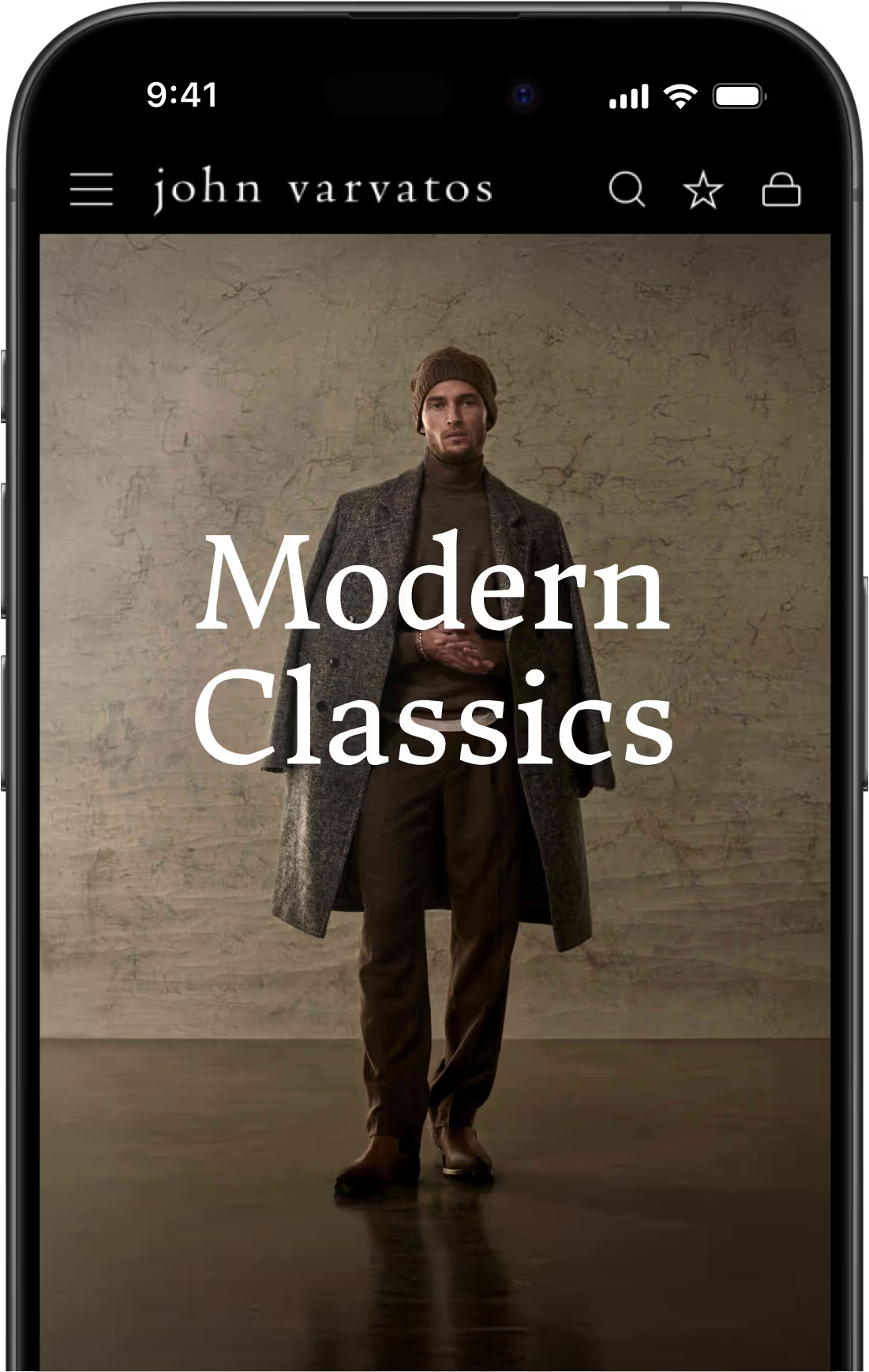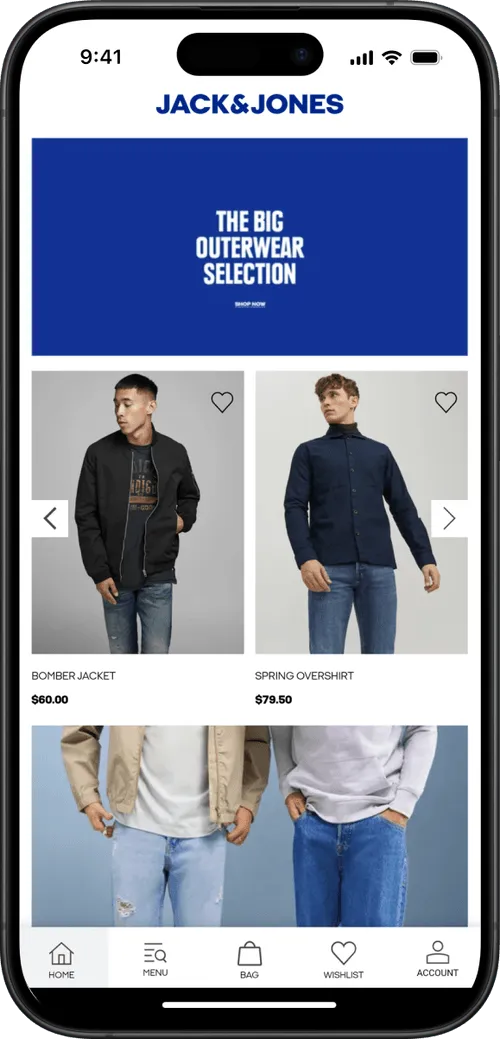The 5 Best White-Label App Builders in 2026
- White-label app builders allow brands or agencies to deliver native mobile apps without coding, for a fast, affordable and convenient route to publishing.
- You can choose from DIY drag-and-drop tools like Buildfire and Appy Pie, or managed solutions like MobiLoud.
- DIY builders are best if you're building an app from scratch, but if you already have a website and want to expand and launch an app, MobiLoud is easily the best white-label option.
- White-label app builders allow brands or agencies to deliver native mobile apps without coding, for a fast, affordable and convenient route to publishing.
- You can choose from DIY drag-and-drop tools like Buildfire and Appy Pie, or managed solutions like MobiLoud.
- DIY builders are best if you're building an app from scratch, but if you already have a website and want to expand and launch an app, MobiLoud is easily the best white-label option.
A white-label app builder is a great way to give your loyal, mobile-first customers a better user experience, boost usage rates on mobile, and increase retention, all while giving customers the illusion that you spent millions of dollars on a custom app.
The cost of app development is astronomical – often in the region of $250k, assuming no major problems during development.
An app builder makes it significantly cheaper, faster and easier to launch your app. And being white-labeled means you can infuse the app with your own branding and boost your brand’s profile.
If you’re running a digital agency, you can use white-label app builders to ship apps for your clients and level up your offering.
Keep reading and we’ll run through the best white-label app builds to choose from in 2026, for a variety of use cases.
Five White-Label App Builders You Should Try
Whether you’re an eCommerce store owner looking to launch an app for your brand, a digital agency building apps for clients, or you’re building internal company apps to improve operational workflows, there are many white-label app builders to suit your needs.
Here are our top five picks:
- MobiLoud
- Appy Pie
- Appian
- Movement
- Plobal Apps
Now let’s dive deeper into each of these white-label app builders.
1. MobiLoud
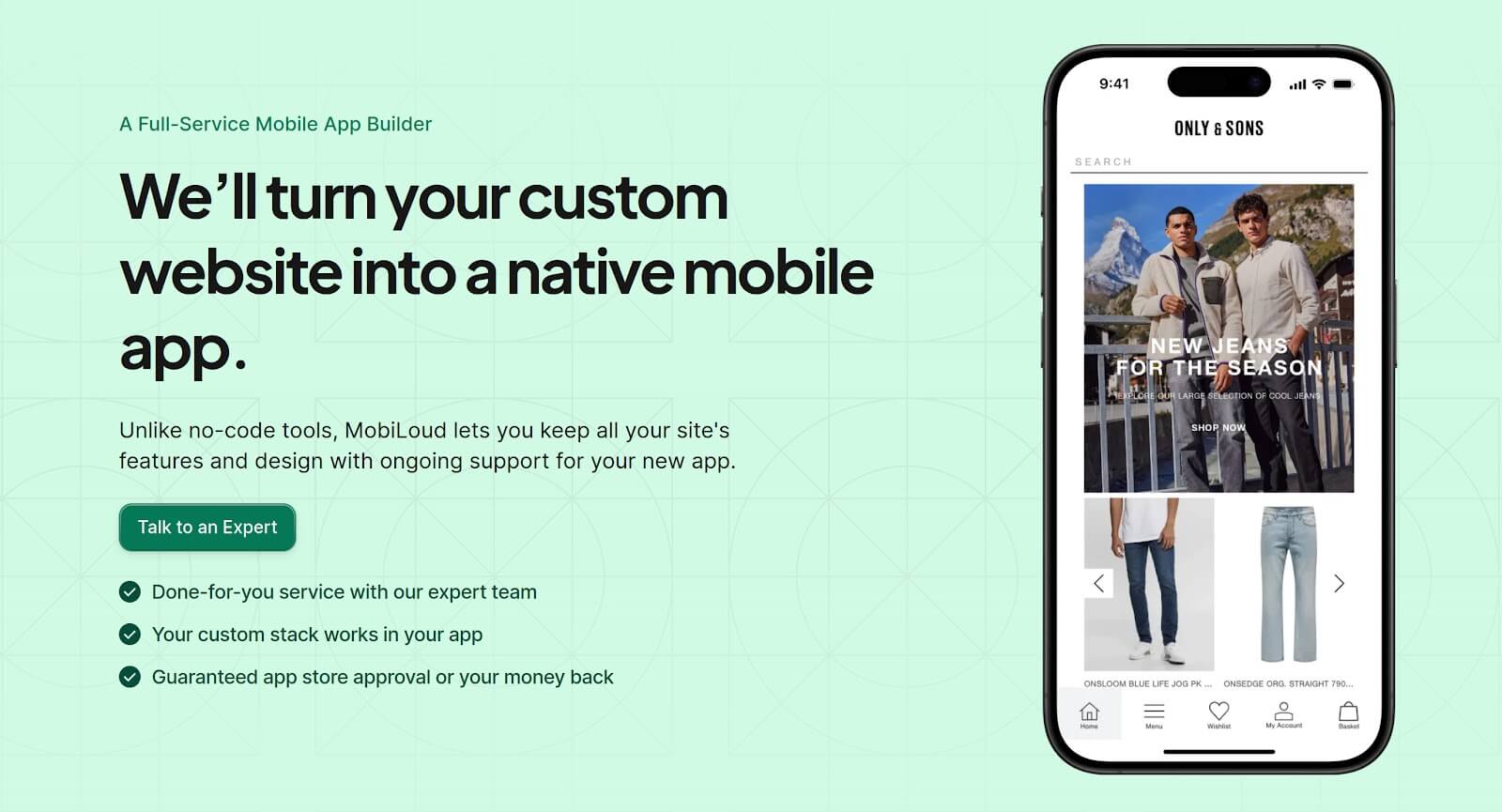
At MobiLoud, we’ve created white-label apps for all sorts of brands and businesses, without requiring them to write a single line of code.
MobiLoud is different to your typical app builder.
We’re not a drag-and-drop tool that forces you to work within pre-defined blocks and templates.
Instead, we fully convert your website into native apps.
These apps are synchronized with your website, so they retain all the same functionality as your website, with the same branding, design, colors and anything else that makes your site special.
When you update your website, the apps update automatically with it. This makes it super easy to manage. Just continue to maintain and update your website, as you normally would.
Everything we offer is, by default, white-label. All plans offer fully white-labled apps, and the apps are uploaded to the app stores under your own developer accounts (though we take care of the app store publishing process for you).
We’ve helped more than 2,000 business build apps, including some of the world’s biggest brands.
VERO MODA, a fashion brand with 3000 stores in 32 countries, previously had a custom-built native app but found that it was expensive and labor-intensive to maintain. They turned to MobiLoud for a cheaper, easier white-label solution.
And they noticed something else beyond the cost and labor savings. According to VERO MODA’s Product Owner Svend Hansen,
"Something we've noticed is that users who use the app are better customers, either they spend more, they spend more often, they come back and we've higher retention."
If you have already gone through the hard work of building a website and want to add an app to your online presence, MobiLoud is the ideal solution for building fully white-label mobile apps.
Pros
- No coding required.
- Fully white-label apps uploaded to the iOS and Android app stores under your own accounts.
- Reuses your existing website, workflows, backend, and branding.
- Much more customizable than DIY app builders.
- Technical maintenance, updates and support included with subscription.
Cons
- Requires a working website to convert to an app.
- You may not be able to integrate your app with all device hardware features.
Ready to learn more? Get in touch with us and book a free consultation, to discuss how we can bring your app to life.
2. Buildfire

Buildfire stands out among other template-based app builders by offering significantly more power and flexibility.
This enhanced functionality comes at a higher price point, making it a premium option in the white-label app space.
With Buildfire, you start with a professionally designed template and expand its capabilities using a wide range of plugins.
The platform offers an intuitive drag-and-drop interface for customizing your app’s user interface, as well as a built-in content management system for effortlessly adding and updating content.
While many features and integrations are readily available, you also have the option to develop custom plugins and functionality using their developer SDK.
This means that if a specific feature isn’t already provided, it can be built (though this does require coding skills, which may not suit purely no-code users).
Their apps are white-labeled, making the platform a great choice for promoting your own brand, or resellers or agencies wanting to build apps for clients.
Pros
- Comprehensive feature set with a wide range of plugins.
- Intuitive, easy-to-use drag-and-drop editor.
- Developer SDK allows for creating custom functionality.
- Robust integrations with popular platforms and tools.
Cons
- The developer SDK requires coding knowledge.
- Some design and feature limitations compared to fully custom-built apps.
- Higher pricing compared to many other no-code app builders.
3. Appy Pie
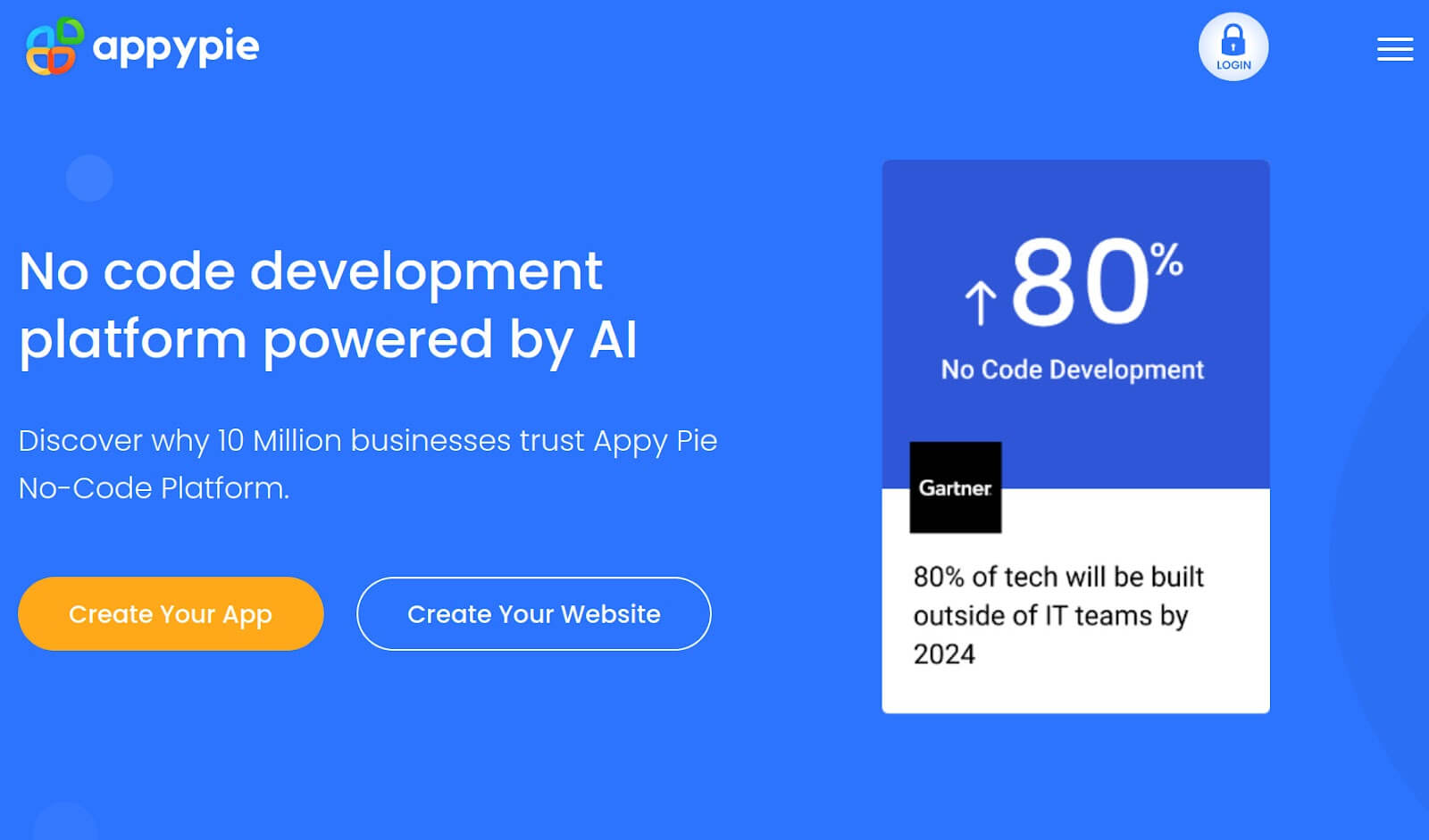
Appy Pie offers a simple, DIY drag-and-drop interface.
Appy Pie is a DIY app builder that, like Buildfire, allows you to work with pre-built templates and a drag-and-drop builder to create working mobile apps.
There are presets for many different use cases, including eCommerce apps, healthcare apps, wedding apps, photo-sharing apps, and more.
Appy Pie’s default plans are not white-labled (your apps will display Appy Pie’s branding), but for twice the base subscription you can purchase their add-on package, which includes white-labeling.
This makes Appy Pie suitable for resellers, agencies, or simply for building apps that show only your branding, nothing else.
Appy Pie does have limitations – it’s not as flexible as other app builders, and it places limits on app downloads and push notifications (charging overage fees for higher use).
It’s more of a beginner-focused app builder, but if you want something that’s straightforward and easy to use, it’s worth a look.
Pros
- Quick and easy to use.
- Templates for all kinds of businesses lets you go live fast.
- No coding required.
Cons
- Not very customizable.
- Difficult to integrate with third-party tools, platforms and websites.
- White-labeling costs extra.
4. Movement
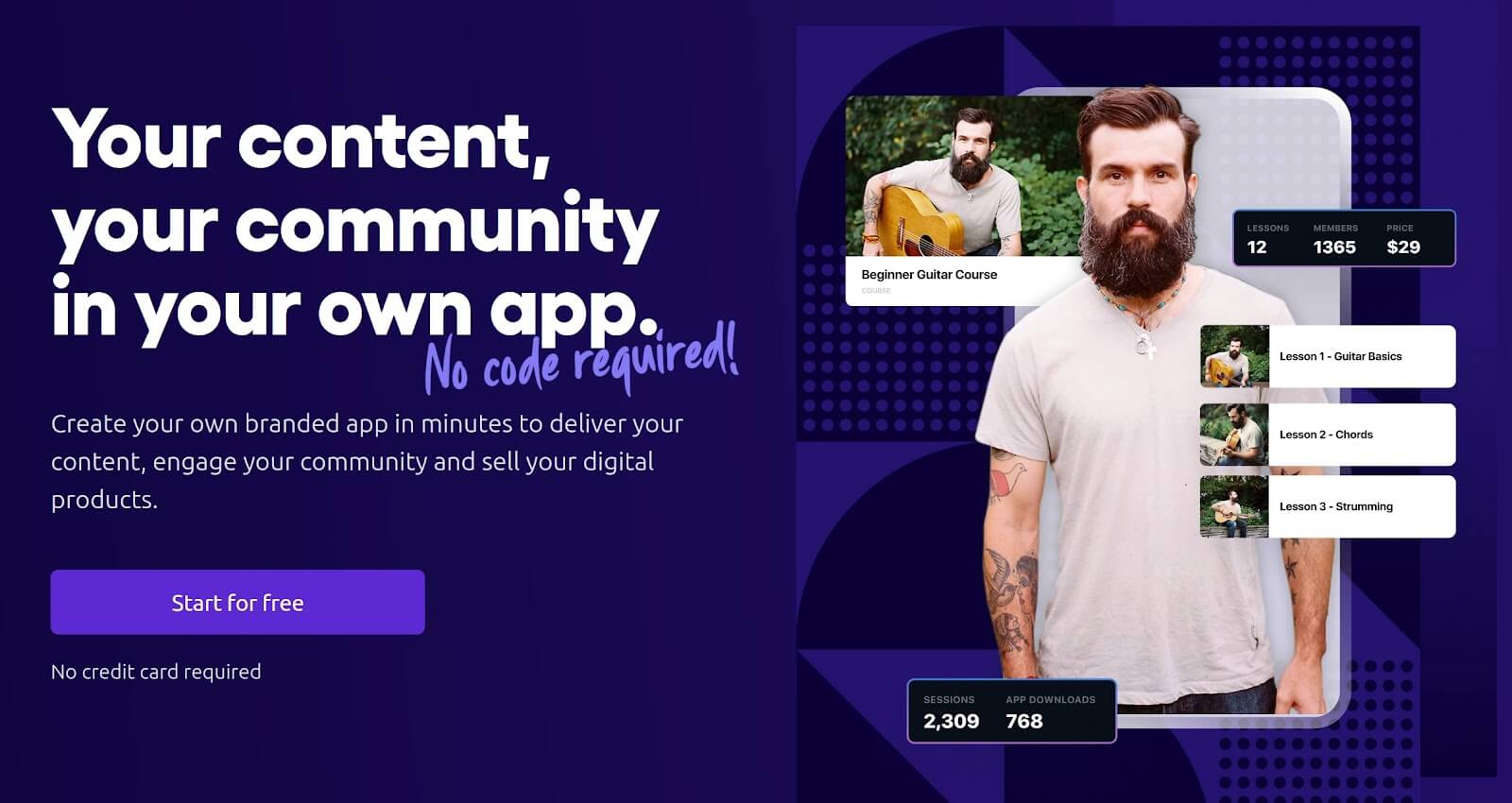
Movement is an app builder specifically designed for creators and small business owners who want to build a mobile app to provide services and build a community.
It’s made for coaches, trainers, course creators, event organizers, creatives and more, who want to monetize their services or content.
You’ll build your app with their no-code, drag-and-drop app builder, and manage all your content and transactions through their platform.
All this at a fraction of the cost of hiring developers to build your digital presence.
For white-labeling, you’ll need to be on their “Pro” plan, the middle tier of three. This is affordable – but if you want to get your app in the app stores, you’ll need the next tier up, which gets pricey.
Ultimately, however, it’s a solid no-code tool, and worth a look for any creators who feel that a mobile app is what will resonate best with their audience.
Pros
- Comes with lots of templates.
- No coding required.
- Covers all the backend functions to run your business.
Cons
- Need higher tiers for white-labeling, custom domains, app store listings.
- Difficult to integrate with other platforms.
5. Plobal Apps
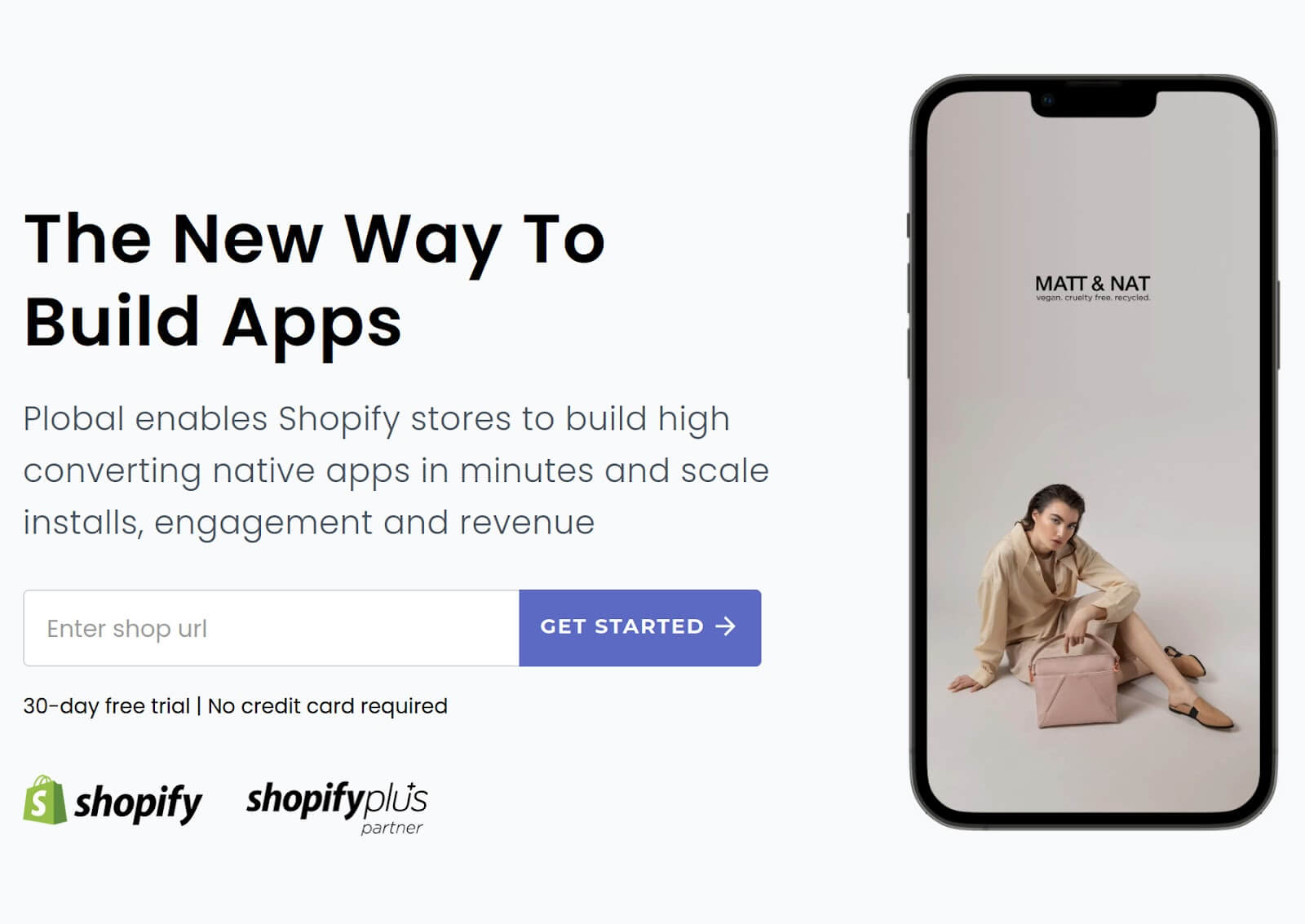
Plobal Apps is a DIY app builder that lets Shopify brands build eCommerce apps.
It provides you with a no-code, drag-and-drop builder, integrated with your Shopify store, to compile and publish true native apps to the app stores.
Your apps will have all the basic mobile features you need to drive sales, including push notifications and integrations with popular Shopify apps and tools.
This is a great way to go live with an app and drive more long-term revenue and loyalty, without the massive expense of custom development.
Like any DIY app builder, Plobal Apps does have limitations in how far you can customize your app, and recreating the user experience of your web store will be difficult.
Their lower plans also limit the number of integrations you can use, so if you rely on a lot of marketing, analytics and CRO tools on your site, you’ll been to pick and choose which make it into your app.
But all things considered, it’s a decent option for Shopify businesses who want a no-code tool to create a mobile app.
Pros
- No coding required, fast publishing.
- API-based Shopify integration makes it easy to import & sync product data.
- Easy-to-use interface.
Cons
- Shopify only.
- Limited number of integrations allowed.
- Won’t be able to fully recreate your web store’s UX.
Building an eCommerce app? Check out our recommendations for the Best eCommerce App Builders available today.
The Best White-Label App Builders in 2026: Final Thoughts
You don’t want your mobile app to be a billboard for someone else’s business.
Whether you’re an agency building for clients, or a business owner creating a powerful brand asset, a white-label app builder offers a fast, affordable and convenient alternative to custom development.
The best white-label app builder depends on what you’re trying to do.
If you need a drag-and-drop app builder to create an app from scratch, Buildfire and Appy Pie can be solid choices, or Plobal Apps for Shopify brands.
Movement is a good option for coaches or creators who want to monetize their audience through a mobile app.
MobiLoud is the best option for any business with a website, who wants to recreate that website in a fully white-labeled mobile app.
We help you go live with incredible mobile apps, indistinguishable from the kind of app you’d get if you paid $200k+ to a crack team of developers.
Yet it’ll cost you just a few hundred dollars per month, with low upkeep costs, minimal effort to build, and complete consistency with your website.
You’ll be generating a positive ROI almost immediately, just through the added exposure, retention and engagement your mobile app brings.
Get a free consultation to learn more about the process, why MobiLoud is better than any other app builder, and how we can help you transform your business this year.
FAQs
Convert your website into a mobile app




